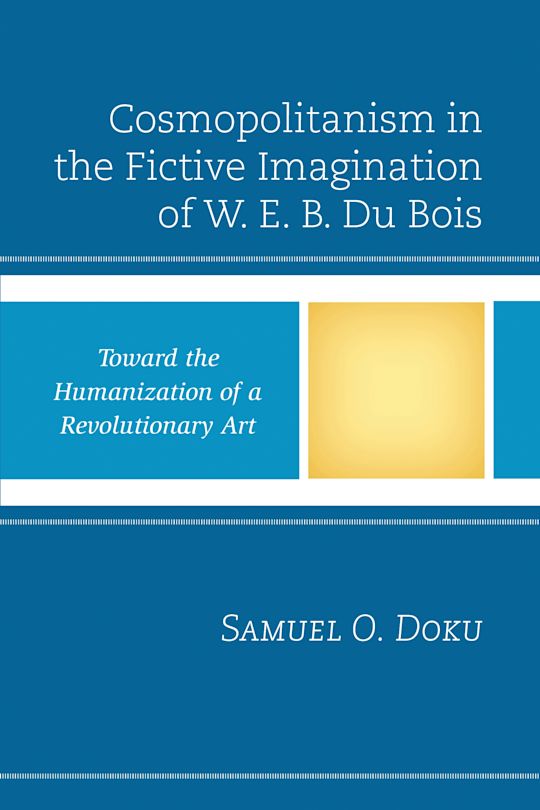- Home
- ACADEMIC
- Sociology
- Sociology - Other
- Cosmopolitanism in the Fictive Imagination of W. E. B. Du Bois
Cosmopolitanism in the Fictive Imagination of W. E. B. Du Bois
Toward the Humanization of a Revolutionary Art
Cosmopolitanism in the Fictive Imagination of W. E. B. Du Bois
Toward the Humanization of a Revolutionary Art
You must sign in to add this item to your wishlist. Please sign in or create an account
Description
This booktraces W.E.B. Du Bois’s fictionalization of history in his five major works of fiction and in his debut short story The Souls of Black Folk through a thematic framework of cosmopolitanism. In texts like The Negro and Black Folk: Then and Now, Du Bois argues that the human race originated from a single source, a claim authenticated by anthropologists and the Human Genome Project. This book breaks new ground by demonstrating the fashion in which the variants of cosmopolitanism become a profound theme in Du Bois’s contribution to fiction. In general, cosmopolitanism claims that people belong to a single community informed by common moral values, function through a shared economic nomenclature, and are part of political systems grounded in mutual respect. This book addresses Du Bois’s works as important additions to the academy and makes a significant contribution to literature by first demonstrating the way in which fiction could be utilized in discussing historical accounts in order to reach a global audience. “The Coming of John”, The Quest of the Silver Fleece, Dark Princess: A Romance, and The Black Flame, an important trilogy published sequentially as The Ordeal of Mansart, Mansart Builds a School, and Worlds of Color are grounded in historical occurrences and administer as social histories providing commentary on Reconstruction, Jim Crow segregation, African American leadership, school desegregation, the Pan-African movement, imperialism, and colonialism in Africa, Asia, and the Caribbean.
Table of Contents
Part One
Chapter 1: Classical Humanism in The Quest of the Silver Fleece and The Souls of Black Folk
Chapter 2: Good Character Challenges Hegemony in The Quest of the Silver Fleece
Chapter 3: Heuristic Appraisal of Avant-Garde Cosmopolitanism in The Quest of the Silver Fleece
Chapter 4: Discrepant Cosmopolitanism in the Imagination of W.E.B. Du Bois in Dark Princess: A Romance
Chapter 5: Culture as a Universal Symbol of Cosmopolitanism in Dark Princess: A Romance
Chapter 6: Beyond the Color Line: Black Cosmopolitanism in The Black Flame
Part Two
Chapter 7: Genesis of Traditional Pan-Africanism and Its Aftermath
Chapter 8: A Botched Continental Pan-Africanism Master Plan and Friends of W.E.B. Du Bois in Africa and the Caribbean
Chapter 9: W.E.B. Du Bois, the Inspirations of Gandhi, and the Pan-Asian Connection
Chapter 10: Barack Obama Epitomizes Du Bois’ Vision in Dark Princess: Nkrumah and Du Bois Emerge as Unheralded Cosmopolitans
Epilogue: The Great Redeemer
Product details
| Published | Dec 03 2015 |
|---|---|
| Format | Ebook (PDF) |
| Edition | 1st |
| Extent | 220 |
| ISBN | 9798216307952 |
| Imprint | Lexington Books |
| Series | Critical Africana Studies |
| Publisher | Bloomsbury Publishing |
About the contributors
Reviews
-
Noted primarily as a sociologist, a historian, a journalist, an essayist, and a civil rights activist, Du Bois (1868–1963) also wrote fiction, in it demonstrating his leadership in the genre of revolutionary art. In examining Du Bois, Doku artfully exposes the historical exigencies of imperialism, colonialism, segregation, and injustice, primarily in Africa, Asia, and the Caribbean. The first half of the book (which derives from Doku's doctoral dissertation) concentrates on two major historical novels—The Quest of the Silver Fleece (1911) and Dark Princess (1928)—in which Du Bois explores the possibility of overcoming systemic racism. The second half gives a historical and practical account of Pan-Africanism and global recognition of human rights. The author looks at the historical, political, and sociological implications of cosmopolitanism as the ultimate political and moral goal of humanity. An original contribution to Africana studies and the sociology of diaspora, this book offers a genuinely interdisciplinary analysis of Du Bois’s literary fiction. The book ends with a panegyric on President Barack Obama. Summing Up: Recommended. Lower-division undergraduates and above.
Choice Reviews
-
Meditating on the expansive horizons of DuBois’s literary and historical imagination, this work outlines DuBois’s cosmopolitan visions. Doku focuses on DuBois’s five novels and early short story 'Of the Coming of John' (1903) to argue for an evolution from 'classical humanism and Africology' to heterogeneous cosmopolitanisms in his thinking. Critical work by theorists including James Clifford and Ifeoma Kiddoe Nwankwo augment Doku’s formulation of the avant-garde, discrepant, and black cosmopolitanisms that shape DuBois’s intellectual trajectory. This work will be of interest to scholars of African and African American studies, diaspora, cosmopolitanism, and modernism.
American Literature
-
Sam Doku’s book reminds us that Du Bois was a literary artist as well as a social critic, sociologist, civil rights activist and Pan-Africanist. Doku’s attention to the nuances and Du Bois’ creative writing demonstrates how fiction is often informed by the personal and the political. Doku’s analysis of Du Bois’ fiction is a welcomed addition to scholarship that seeks to reveal the complexities of one of the greatest scholars of the twentieth century.
Gregory Hampton, Howard University
-
In this sophisticated and innovative study, Samuel Doku explores tensions between DuBois’s black identity and his universalism through the lens of cosmopolitan theory, bringing important attention to lesser-known works by DuBois. Doku proposes that the ideals of cosmopolitanism can lend insight into the aspirations of DuBois and, potentially, other African-American writers as well.
Laura J. Rosenthal, University of Maryland


































